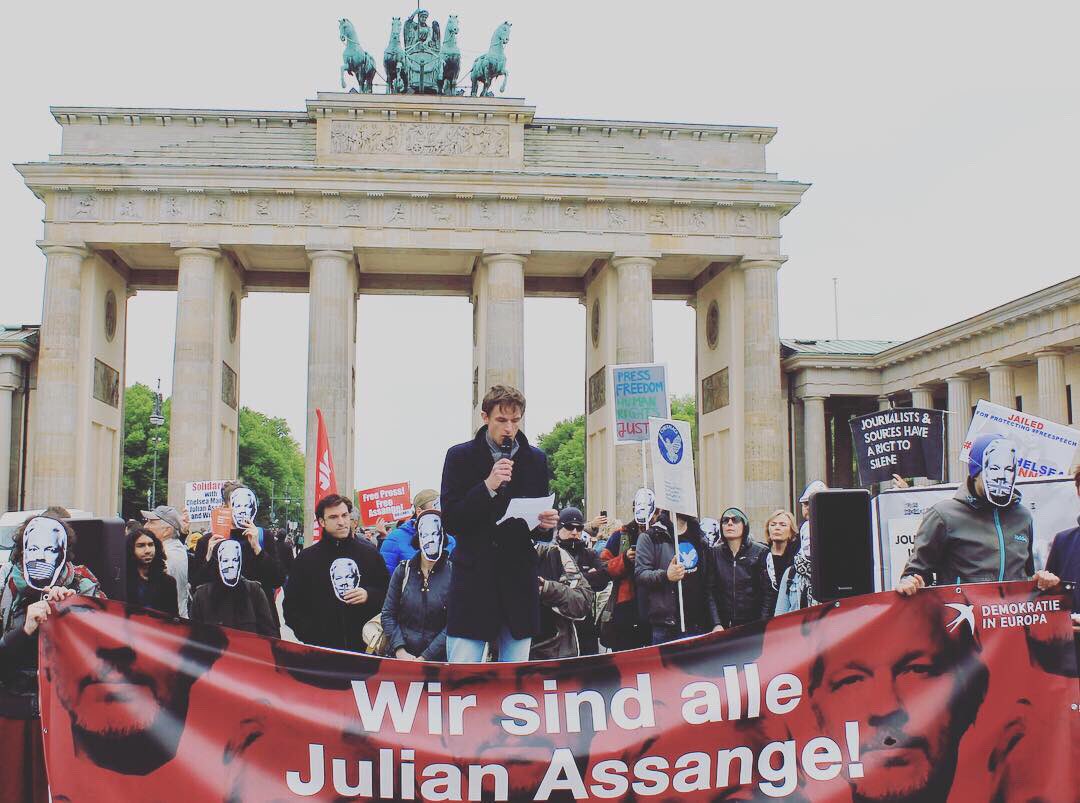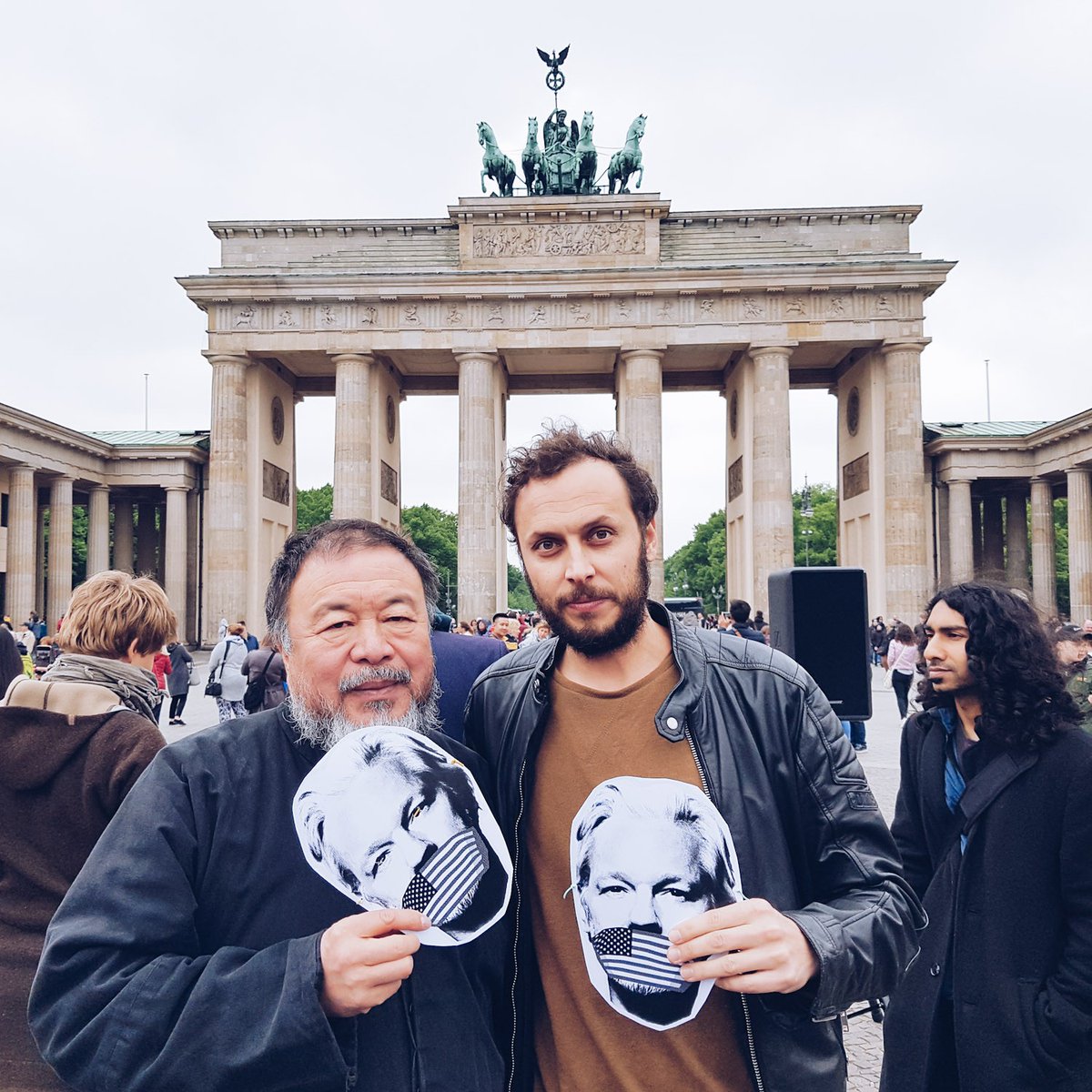
The Green New Deal needs an anti-war message
“I have taken the conservation of our natural resources as the first lesson
that points to the necessity for seeking community freedom’’ Franklin Delano Roosevelt, 1912
The Green New Deal can only succeed as an internationalist campaign — and that means listening to many other, non-ecological concerns expressed by populations most impacted by global warming.
Wars, financial crises, and transnational economic pressures weigh more heavily in the conversations of people from South of the Tropic of Cancer (including Central America and the Middle East) and those below the Tropic of Capricorn (such as Argentina, where global warming remains the last concern of a depressed, insolvent citizenry witnessing the creeping return of militarism.)
Advocates of a Green New Deal must reckon with the fact that our very ability to implement these ambitious climate-saving programs requires the basis of peace.
We should be wary, then, of rhetoric that ‘green-washes’ war, as when Obama insisted that drone aircraft proved ‘more ecological’ than earlier bombers.
We should be wary, as well, of the Singaporean regime’s pride in its solar-powered city-state, walled off from the conflict that surrounds it.
Green activists will be late to only now attack these inner contradictions, though they must. Any futile severance of anti-war agenda from the climate movement needs our criticism.
To successfully realize global Green reconstruction, and the employment it could generate, we must also pressure States to preserve peace: conflict zone with harsh sunlight may be perfect for the installation of solar panels, but their inhabitants are far too busy fighting for their survival.
So let’s have a more internationalist Green New Deal. All our struggles remain related and interdependent.
Arturo Desimone is an Aruban-Argentinean writer and visual artist, currently based between Argentina and the Netherlands.
His articles on politics previously appeared in Open Democracy, CounterPunch, El Andén and various literary journals. For more info see his blog www.arturoblogito.wordpress.com. He’s also member of the thematic DSC Military and Foreign Policy 1
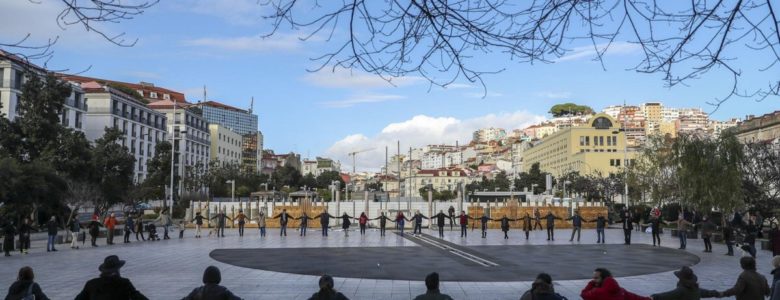
Statement against the illegitimate redevelopment of the Praça Martim Moniz in Lisbon
In the evening of Tuesday November 20th of 2018, the Lisbon Municipal Council (CML) presented the redevelopment of Praça Martim Moniz, one of Lisbon’s central squares.
Against this anti-democratic imposition!
For citizen participation and democratic municipalism!
Notwithstanding the lack of prior notice, the CML and Moonbirgade, the private developer, faced a room full of local citizens in the Hotel Mundial. In general, the reactions were of opposition to and criticism of the plan, both because of the planned use of repurposed ship containers and because of the obsession in turning the praça into a commercial area or “terraces for tourists”.
Despite this clear opposition of a majority of citizens present at the presentation meeting, the CML kept to Moonbrigade’s planned project, and re-introduced it, with some minor alterations that would include some extra trees, in another presentation session in December.
DSC Lisbon 2 affirms its solidarity with the movement of opposition to this plan and its process that emerged and demands that the square’s future be decided democratically, with the participation of all interested Lisbon inhabitants! Public spaces belong to the people and their use should be decided by the people!
Furthermore, this opposition movement has already yielded some results, as the works on the square were stopped in order to enable a deeper public discussion. But public discussions or consultations are not enough. The population is not a mere consultant, they must be the ones to decide!
DiEM25’s DSC Lisbon 2 supports the popular movement that emerged to demand a participatory process and to present a concrete proposal that responds to the population’s needs: a green area for Martim Moniz.
Join this movement and show CML what true democracy is! Send an e-mail of support to [email protected]
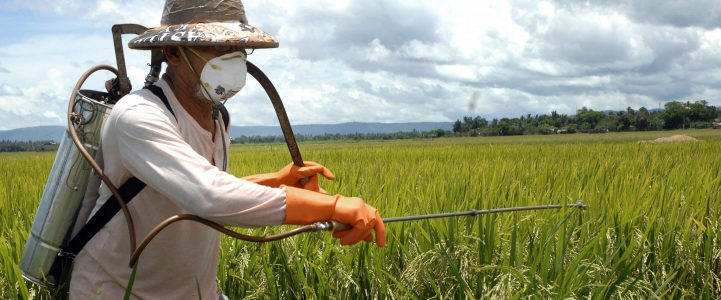
Save the Bees
The implementation of The Bee Guidance, an EU guideline to protect bees from the harmful effects of pesticides, has been on hold in member states across the EU since 2013. And under pressure from the obstructionists, the guideline is now being drastically modified.
Confidential documents from Follow The Money, a Dutch platform for investigative journalism, show that advanced plans exist in Brussels to weaken significantly the pesticides guideline. The watered-down version was presented to the member states behind closed doors on 24 and 25 January 2019. Around 20 tests to investigate the risks to bees are deleted. In a confidential e-mail, the Netherlands asked the European Commission to remove even more studies from the guideline.
Follow the Money finds it striking that in confidential correspondence, the Netherlands argues in particular for the deletion of field studies. Exactly the same plea can be found in a lobby letter that the Dutch representatives in Brussels received on 15 January 2019 from the European Crop Protection Association (ECPA), the interest group of pesticides manufacturers, including Bayer, BASF and Syngenta.
In a response to Follow The Money, the Dutch Ministry of Agriculture stated that the position of the Netherlands was established on the basis of advice from the national pesticide regulator. These opinions, however, are not public. A decision on the EU pesticide guideline is expected in Brussels after 20 and 21 May’s meetings.
Three quarters of the world’s agricultural crops depend on insects, in particular on bees, for fertilization; the same applies to many wild plants. There is little disagreement among scientists; the causes of the bee’s mortality are habitat loss, and the ruthless use of synthetic pesticides. More than 40 percent of all insect species suffer from mortality, and a third are even threatened with extinction.
Looking for some more respect for nature? Find it in DiEM’s transnational programme European Spring. DiEM’s position: For too long, the EU has allowed private interests to ravage our natural habitat.
DiEM25 will align the Common Agricultural Policy (CAP) with policies like the Pesticides Directive and the Birds and Habitats Directive. It will transform European agricultural and land use policy in order to guarantee food and resource security and improve environmental sustainability.
DiEM25 also proposes a public “Mandatory Lobby Register” that requires all lobbyists to register with the EU and requires all EU officials to report when, where, and why they meet with lobbyists, as well as any benefits they receive from them — directly or indirectly, before or after the lobbying campaign. The current EU lobby register is “voluntary.” DiEM25 believes that all lobby groups should be forced to disclose how much they spend on their campaigns, and which officials they target. Minutes of all such meetings must be prepared and submitted to an independent oversight body.
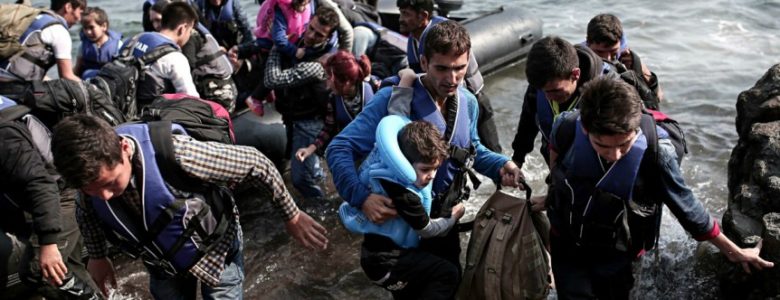
Fortress Europe fails humanity
People have lost their lives trying to get into Europe for decades. In June 2018 the migrant body count was 34,361 and rising.
Deaths have occurred at sea, in detention blocks, asylum units and even town centres. The EU has recently clamped down on sea patrols in the Mediterranean, which rescued about 45,000 refugees in the past. Italy earlier declared its waters closed to rescue boats and called on other countries to open their ports, but none came forward.
This is not a “refugee crisis” but a crisis of European values and ineptitude. Instead of formulating a solution based on solidarity and shared responsibility, Europe is pushing the issue of migration beyond its borders by paying Libya, for example, to intercept, detain, and torture migrants.
People have little choice but to flee war, persecution or abject poverty. And let’s not forget Europe’s role in creating these painful circumstances: destruction and war in Afghanistan, Syria, Iraq, etc. and economic and trade deals exacerbating poverty in Africa. Throwing money (humanitarian aid) at these countries, as the EU is doing, will have no long-term effect while these policies continue.
Instead, Europe must completely revamp what’s known as the Dublin System, which forces migrants to stay in the first EU country in which they were processed.
Dublin system
Due to their geographic location, Greece and Italy receive the majority of refugees. On arrival, they are registered and fingerprinted. But facilities are overfull, waitlists long and state benefits very limited. Many live on the streets and face sexual abuse, forced prostitution or domestic slavery in Italy. They’re compelled to seek asylum elsewhere.
But countries like the Netherlands stop asylum seekers’ procedures when their fingerprints are identified, invoking the Dublin regulation to deport them back to the country that registered them. Some refugees resort to burning their fingertips to avoid getting trapped in this nightmarish Catch 22. Those already trapped by a Dublin claim (“Dubliners”) obviously don’t wait to be deported; they “disappear”. In 2018 the Netherlands made 1150 Dublin claims to Italy – but only 180 people were actually returned. The Dublin claim expires after 18 months – and “Dubliners” hope to stay off the radar until then.
Dutch asylum centres don’t accept “Dubliners”, though some are being sheltered by individual households. Their hosts refrain from registering them with local authorities as required, due to the likelihood of deportation. This should serve to remind us of another time, decades ago, when many Amsterdammers defied authorities to hide victims of persecution in their homes.
The Dublin regulation places a disproportionate strain on coastal countries like Greece and Italy. In 2015 the EU tried to ease this burden by relocating 160,000 to other EU countries following quotas based on the country’s capacity. However, only 30% were actually relocated. The Netherlands promised in 2017 to take in 8712 refugees from Greek camps – but as of April 2019 only 1755 have been brought over. Thousands of asylum seekers remain stuck in places like Greece, waiting to be reunited with family members in Germany and elsewhere. Most countries took in less than their quota; others completely refused, notably the Visegrad group: Czechia, Hungary, Poland and Slovakia. Though the majority in the European Parliament is in favour of replacing the Dublin regulation by a centralised system of shared responsibility, the intransigence of these governments still stands in the way.
Life-threatening deportations
No common EU policy exists against life-threatening deportation. The Netherlands and Sweden reject most asylum seekers from Afghanistan, while France and Italy accept almost all, and don’t use the Dublin regulation to send them away. But only 35% of Afghan asylum seekers have been accepted in the Netherlands. The rest must in principle return to Afghanistan, one of the world’s most dangerous countries – and now more so than ever. In 2018 an estimated 26,500 people were killed there, including 3804 civilians and over 900 children. Since 2015, 160 Afghan asylum seekers have been forced onto planes back to Kabul from the Netherlands. Dozens are currently at risk of deportation. Hundreds more have gone “underground” or fled to another EU country.
By failing refugees Europe has failed itself
“We have all but abandoned mutual solidarity between member states, a core principle upon which this Union is built. Refugees and their lives have become the object of a political blame game, fuel for far-right populism and xenophobia,” says Cornelia Ernst, MEP.
It’s time we asked whether a culture can be called civilised that treats people as fair game for abuse because they come from poor war-torn countries.
We call on the EU to introduce a centralised asylum procedure without further ado, one that can be initiated at any point of arrival in the EU. Criteria for allocating host countries should include the asylum seeker’s preference as well as the country’s capacity. Member countries cannot continue to benefit from pooled EU resources without sharing responsibility in times of need. Those exceeding their refugee obligations deserve prioritised funding while those falling short should be penalised.
Let them in!
At DiEM25 we say: let them in. It is their fundamental human right — by which we also stand to gain: Europe is aging. We need migrants. We need refugees.
We call for a humane common asylum system, the closure of detention centres and the provision of adequate reception facilities and support in finding employment. We propose a European search and rescue operation to prevent migrant deaths at sea. The externalisation of EU borders to Libya and other countries must be terminated.
Sona Prakash is a member of the DiEM25 thematic DSC Peace and International Policy
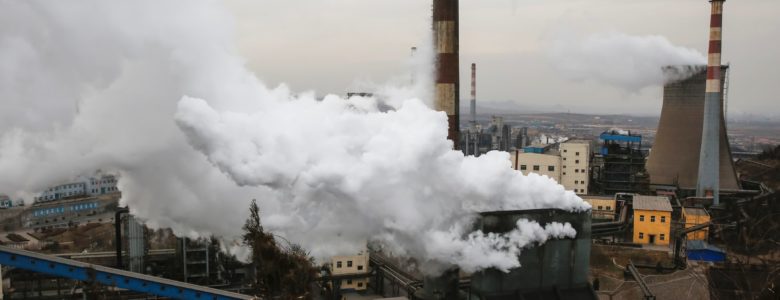
Climate rebellion now
Extinction Rebellion, one of the most visible and successful campaigns of the climate movement, has drawn much ire from the political establishment. But it is precisely because XR challenges the establishment that it has moral authority and legitimacy: its principles of civil disobedience and conscientious objection force politicians to take responsibility for their woeful inaction on climate change, and reconsider proposals like DiEM25’s Green New Deal.
The climate rebellion follows in the tradition of the civil rights movement, a sprawling grassroots protest fighting for communities of colour, their franchise, and the end of state segregation. Their fearless resistance to the corruption of status quo politics, undertaken at great personal cost and the risk of their lives and livelihoods, focused people’s attention on the moral abyss of life in a racist state. While conservative politics wheeled out a bankrupt morality to delegitimise the civil rights movements, civil rights leaders dared to do what was forbidden — and awoke a nation in the process.
The rising threat of climate change is rattling our societies. Those who profess easy answers are naive, but those who maintain faith in the same politicians who engineered this crisis are equally misguided. It is clear only a mass citizen lobby has the authority and imagination to make the choices necessary to move forwards.
XR must be a wakeup call. With environmental catastrophies already killing in the global south, the sense of a coming Armageddon must take hold.
DiEM25 believes that toxic energy systems owned by and run in the interests of the 1% have no place in democratic society and that all citizens perspectives must be heard and supported, especially those who stand to lose the most from climate change. We call on all politicians to stop maligning the XR movement and stand in solidarity by finding the political will to start making necessary changes to curb emissions as a matter of emergency.
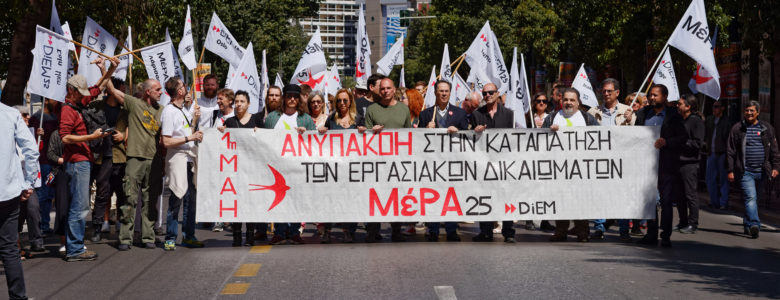
European transnational solidarity in action: Athens Labour Day 2019
DiEM25 members from 20 different countries joined their MeRA25 counterparts in Greece to send a loud message to the Greek and European Establishment:
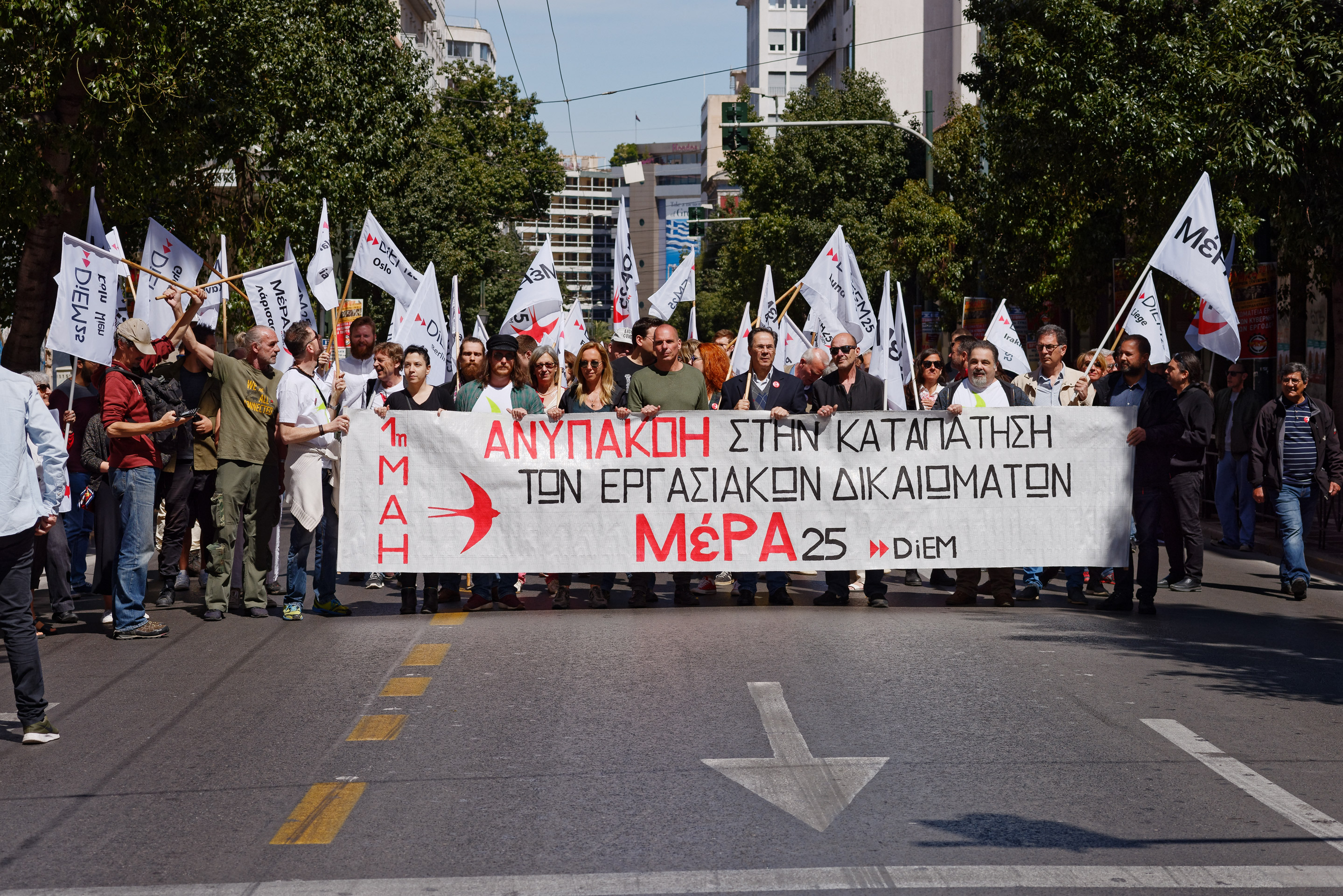
DiEM25 1st May Demo Athens 2019 [photo (c) Neal McQueen]
- There is no struggle between the North and South, the West and East of Europe, but between Established and Authoritarian forces, and progressives. This fight knows no borders and neither do we
- Greeks do not stand alone, and they never have. There are millions of Europeans who are not represented by the misanthropic and irrational austerity measures imposed on Greece (and across the EU) in their name
- The fight for dignity and shared prosperity was not lost in 2015 – it is only just beginning, and DiEM25, with its constituent parties and allies across Europe, are at the forefront of it
- At last, after the betrayal of SYRIZA, there is a party in Greece which offers political representation to those disenfranchised voters who do not wish to abandon the European idea to those who have mismanaged it for so long, but who also do not feel represented by blind loyalty to an EU that tramples its founding principles
- Finally, in these European elections, Europeans are offered an opportunity to vote as one demos through European Spring: whether one votes in Greece for MeRA25, in France for Génération.s and DeME, in Germany for Demokratie in Europa etc. They are voting for the same progressive, transnational programme and vision for Europe
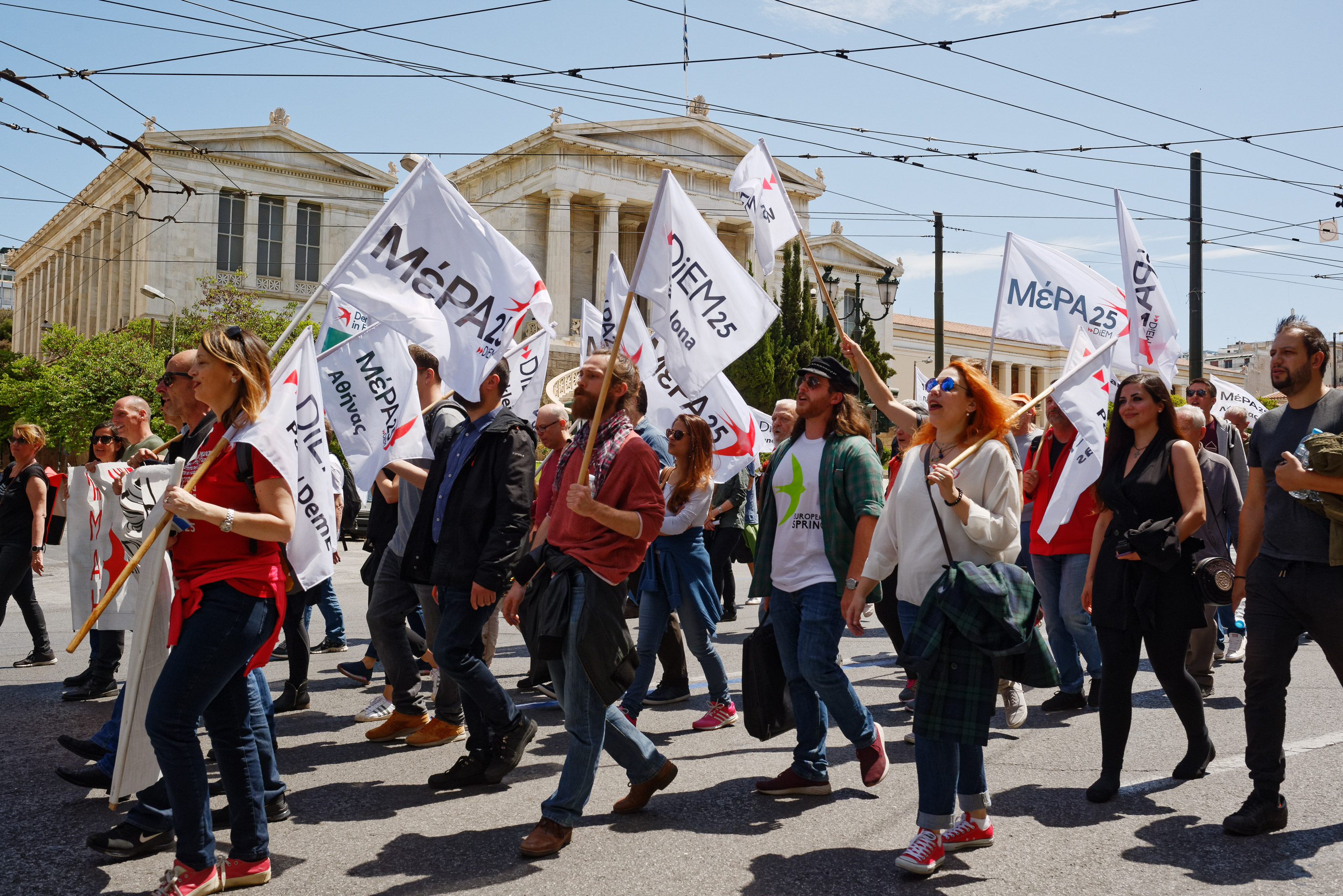
DiEM25 1st May Demo Athens 2019 [photo (c) Neal McQueen]
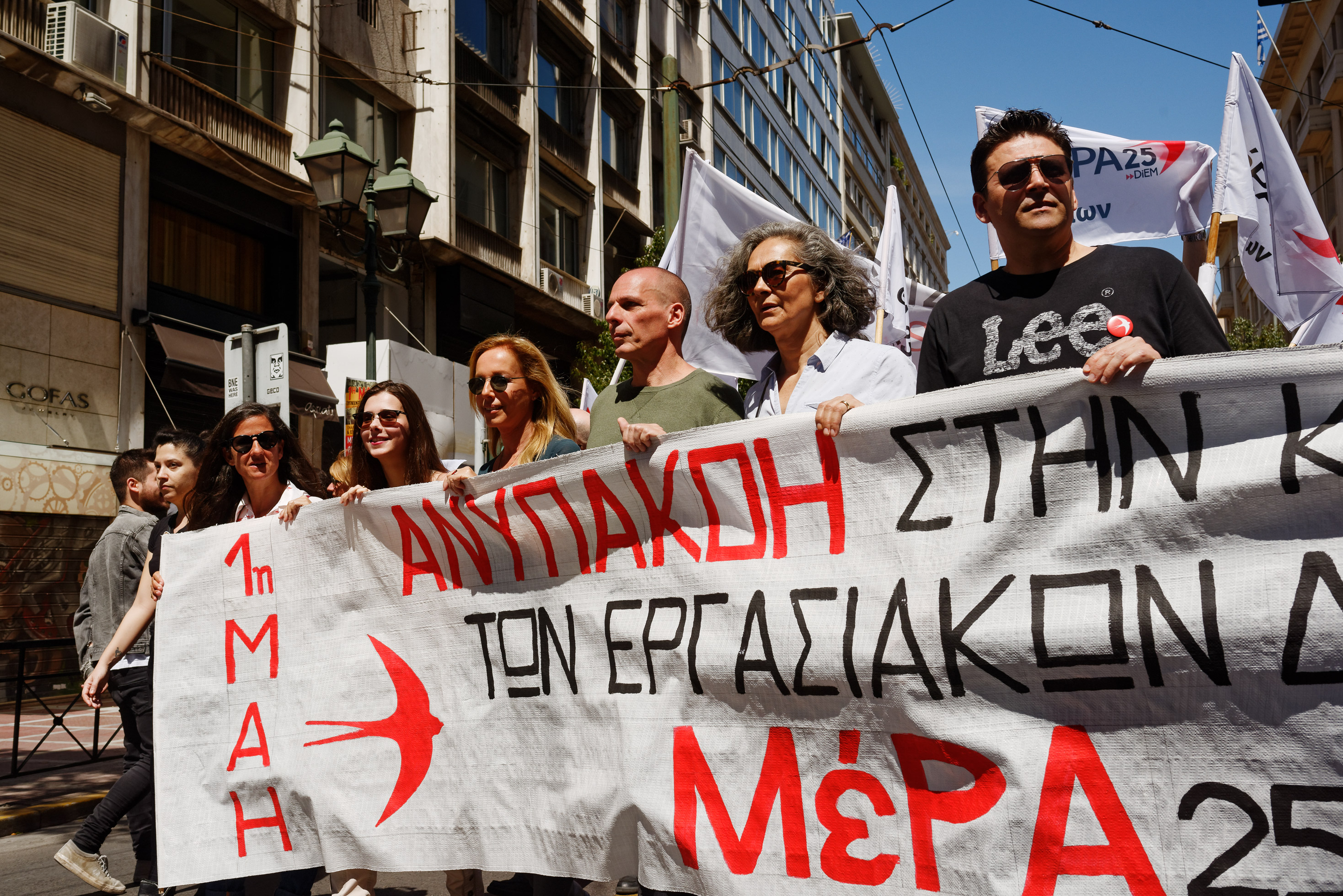
DiEM25 1st May Demo Athens 2019 [photo (c) Neal McQueen]
- Trikala, 2/05
- Volos, 3/05
- Chaidari (Athens), 5/05
- Alexandroupoli, 6/05
- Xanthi and Komotini, 7/05
- Kavala, 8/05
If you live in Greece, or know someone who does, share this with them and ask them to join their voices to ours. In Greece, people say one that “one swallow does not bring Spring”. We bet, however, that a swarm of them will!
Click here to read our Green New Deal for Europe, our European elections programme.
Carpe DiEM!
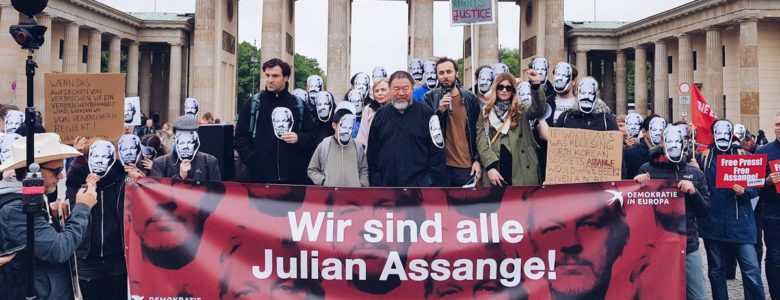
We are all Julian Assange! – UPDATED
Hundreds of activists gathered today outside the Brandenburg Gate in Berlin to protest against the extradition of Julian Assange to the US.
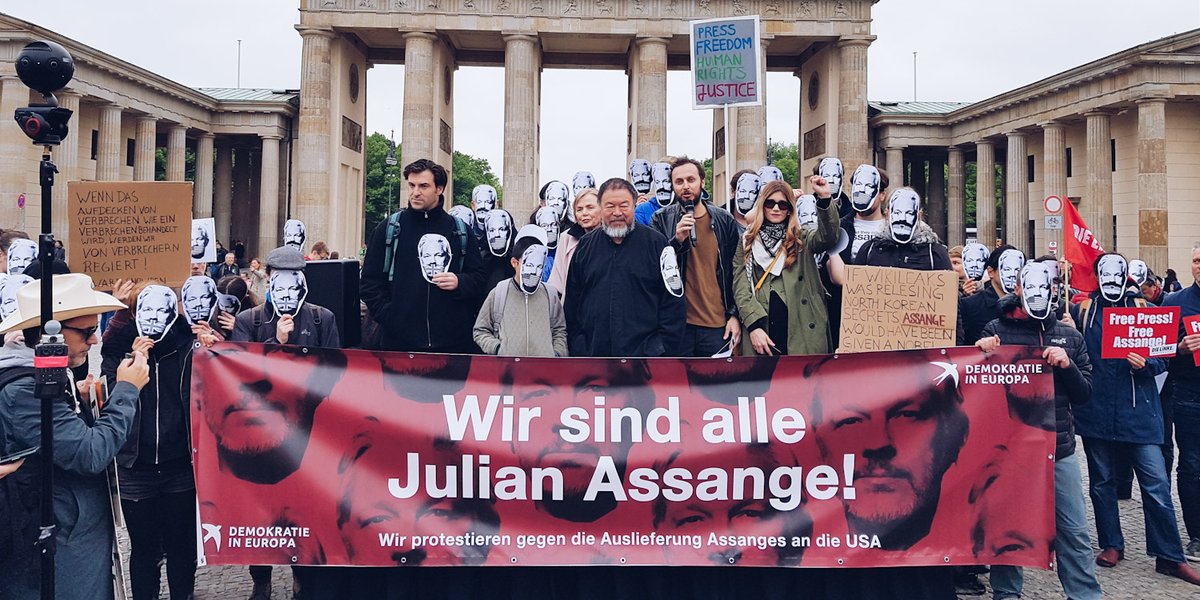
The protest, organised by DiEM25, counted with the participation of Ai Weiwei, Angela Richter, Srećko Horvat and many others and featured an exclusive letter from Edward Snowden, which was read out by Angela Richter.
Check out the videos below!
Letter from Edward Snowden in support of Julian Assange
For years, Julian Assange has warned that the moment he found himself outside political asylum, the government of the United States would demand his imprisonment, warnings that in each of those years were discounted by his many critics as ridiculous, but today have been shown to be true.
“There was a dream of what Europe could be, and that is a dream that Europe has lost, and the lack of that dream is producing its fragmentation, it permits rogue states in Europe, states that compromise the genuine interests of the European people (…) that collapse in the dream of Europe is something that cannot be permitted, we must fight against it. Otherwise, winter is coming, war is coming, the end of Europe is coming, and either we must seize the day, and divert Europe from the cause it is on… or else we will have to suffer through a very harsh night.”
(Julian Assange, DiEM25’s Advisory Panel member, at DiEM25’s launch in Berlin)
On the day of the first extradition hearing in London’s court, we are inviting you to join the public protest DiEM25 and Demokratie in Europa will be staging at one of Germany’s most iconic monuments: the Brandenburger Gate.
On Thursday, May 2, 2019, we will demonstrate just a few meters away from the UK and US embassies – the two countries that hold the future of WikiLeaks founder and DiEM25 Advisory Panel member Julian Assange and freedom of press in their hands. Please tell everyone you know about the protest!
You see,, Germany is not – and should not be – an innocent by-stander.
As we already know from Edward Snowden’s revelations on NSA spying on Germany, the sovereignty of Germany – its journalists and the privacy of its citizens – is also under threat. The May 2 court hearing in London is more than just about Julian Assange. It’s about our right to know. It’s about you and me.
And while Chelsea Manning remains in prison, precisely because she rejected to testify against WikiLeaks, the protection of whistleblowers has never been more important – and urgent, all across Europe, including Germany. The stakes are global.
It’s highly likely that the US is preparing to file more charges against Julian. The current indictment is but an attempt to criminalise long-established source protection practices and journalists working with whistleblowers aiming to disclose classified information for the public interest.
Scores of press freedom organisations, news outlets, United Nations representatives, politicians and public figures have denounced Julian’s arrest and his possible extradition and have warned of its worrying implications.
Whatever the outcome of the court hearing, the very fact that Julian is being kept in solitary confinement at the “British Guantanamo” Belmarsh prison, is enough for us to gather at the Brandenburger Gate to protest against the inhuman conditions he is facing now and to loudly say Stop the extradition of Julian Assange!
Join us to lend our voice to Julian and to the journalists, whistleblowers and freedom of press activists around the globe who’s lives are at risk for defending our right to know. If you don’t live near Berlin, spread the word and spread the petition against Julian’s extradition.
The “We are all Julian Assange!” protest will begin at 12:00 with speeches by German theater director Angela Richter, Whistleblower Network chairman Annegret Falter, biologist and founder of EcoLeaks Esteban Servat, and myself. The speeches will be followed by a reading of a short statement by Edward Snowden brought by Angela Richter from Moscow to this special DiEM25-led public demonstration.
For Edward Snowden, our demonstration is not just about “a man who stands in jeopardy, but the future of the free press”.
And last but not least, a DiEM25 and Demokratie in Europa message to all German voters: don’t vote for any party at European Elections that is not ready to stand in the protection of whistleblowers, freedom of press, and, more specifically, to oppose Julian’s extradition to the United States.
There is no future for Europe – no democracy – without the freedom of press.
Looking forward to seeing you at Brandenburger Gate (Pariser Platz) on May 2 at 12:00.
Here are some masks you can print for the protest: Mask-Germany, Mask-US, Mask-UK
We are all Julian Assange!
Srećko Horvat
>>DiEM25 co-founder

On "rats" in Europe: We condemn any sort of anti-semitism!
“Words can be like tiny doses of arsenic: they are swallowed unnoticed, appear to have no effect, and then after a little time the toxic reaction sets in after all.”
Victor Klemperer, LTI – Lingua Tertii Imperii, 1947
As soon as we encounter depictions of people as rats who carry contagion and devour precious resources, we can be sure that anti-semitism – and the language of National Socialist propaganda and hatred – is lurking behind the sinister corner.
Even before the rise of Nazism to power, “rats” were a recurrent description of Jews (and other “uncivilized and parasitic people” like the Roma people or gays), which reached the ideological peak with the anti-jewish Nazi propaganda film Der Ewige Jude (The Eternal Jew) from 1940, and served as the ideological justification of the Final Solution, with horrific consequences not only for the Jewish people, but Europe as such.
When, for Easter 2019, the deputy mayor of Adolf Hitler’s home town – Braunau am Inn – published a poem under the title Die Stadtratte (The City Rat) in a local newspaper, it was not just a benign act of a bad poet who compared migrants to “rats”.
Although Christian Schilcher of the far-Right Freedom Party (FPÖ) stepped down as deputy mayor, and even Austria’s chancellor, Sebastian Kurz, demanded that the Freedom party – with which his own People’s party is in coalition – distance itself from the “abominable” poem, we are concerned that this case of a bad and sinister poet from Adolf Hitler’s hometown is not just an isolated case of antisemitism in today’s Europe. It is the top of an iceberg of accumulated hatred towards the Other, whether it is a Jew or Muslim, migrant or refugee.
The deepening crisis of Europe’s economies and societies instead of being located in Europe’s deep establishments’ utter incompetence, is now, once again, being blamed on the migrants.
But let us not be deceived: it was precisely Sebastian Kurz’ government that closed the borders during the Balkan refugee crisis and prepared the conditions for such “rats” poems to appear.
It is not enough just to distance oneself from antisemitism, we must be building such a society in which bad poets comparing migrants to “rats” would just stay that – bad poets destined to be forgotten, and not politicians who represent a party that is in coalition with Austria’s leading party”.
We at DiEM25 know very well that language is never just language, that words can be, as the great German author and linguist of Jewish descent, Victor Klemperer put it, “like tiny doses of arsenic” which can literally prepare the terrain for concentration camps.
Photo: image from the Nazi propaganda film The Eternal Jew
Keywords: antisemitism, Israel
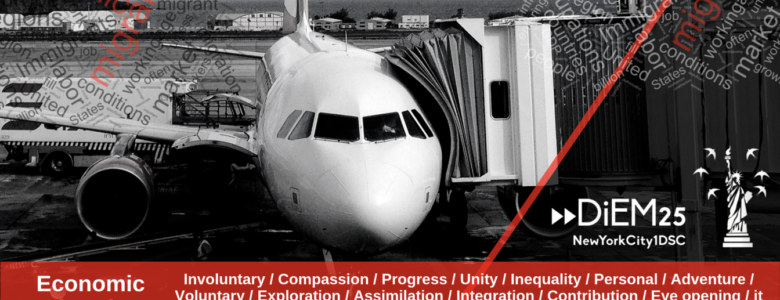
Economic migration: breaking down the myths
All of us have some experience with migration, whether it is purely for economic reasons or to flee from war, whether it involved our parents’ generation or our own. Blending all these perspectives, we ask ourselves: is economic migration an individual choice, or a necessity? How does global capitalism shape the situation of migrants around the world?
Migrants today are the scapegoats of the far right: blamed for low wages, high crime rates, drugs. But the truth is that migrants not only provide additional work force but also boost consumption and push societies forward with their diverse perspectives and cultural heritage. Regardless of these contributions, the borders are hardening and the walls are rising.
What is to be done?
As progressives, we believe in collective actions at both the local and global level. To fight the myths around economic migrants, we should champion diversity, inclusion and equity for migrants in our everyday life and work — reminding ourselves and our societies that economic migrants, just like refugees, arrive to our shores to seek a better life. Building a movement bottom-up — and standing together with all the migrants in our communities — we should push for legislation and building bridges, not walls.
The above is a summary of the discussion during the event on Economic Migration organised by DiEM25 New York 1 DSC. Many thanks to The People’s Forum and Effie’s restaurant
